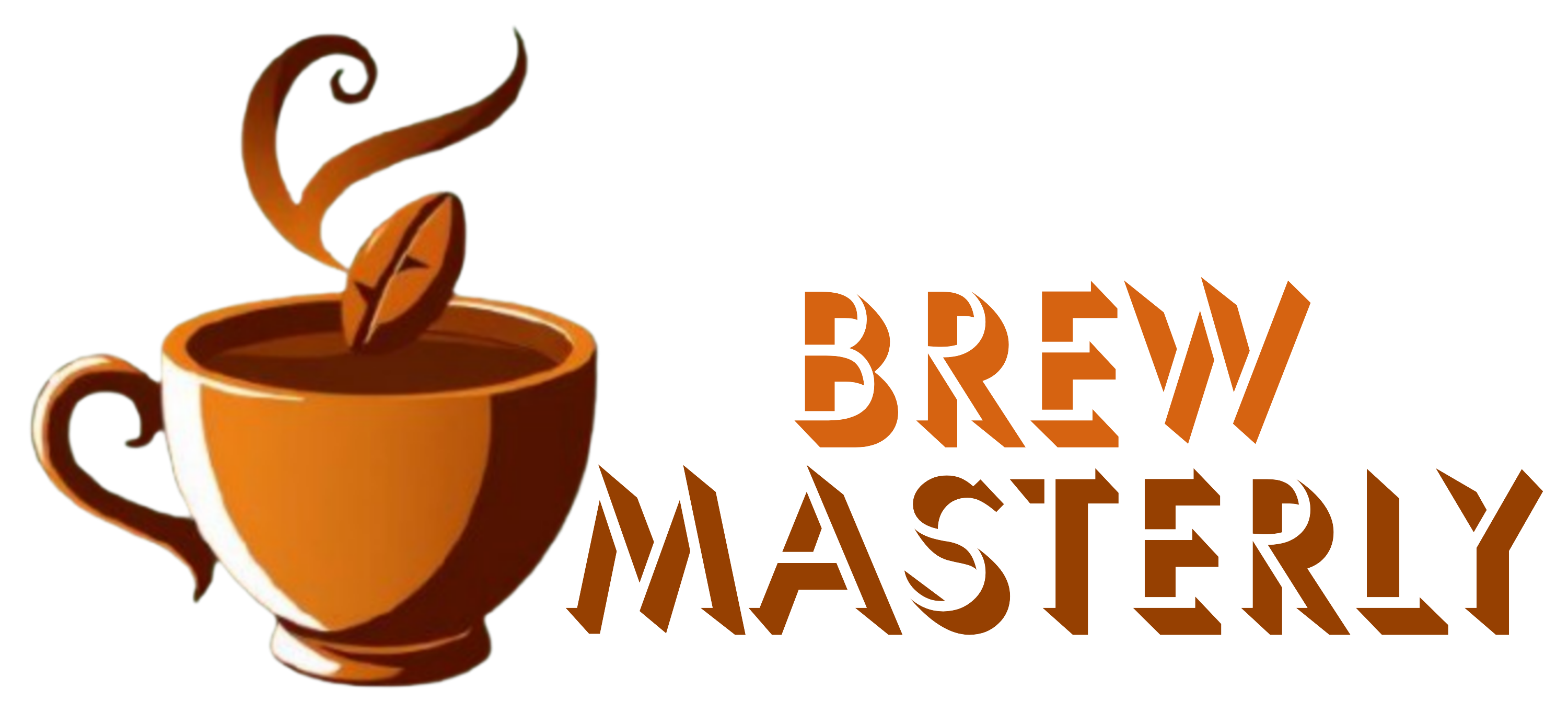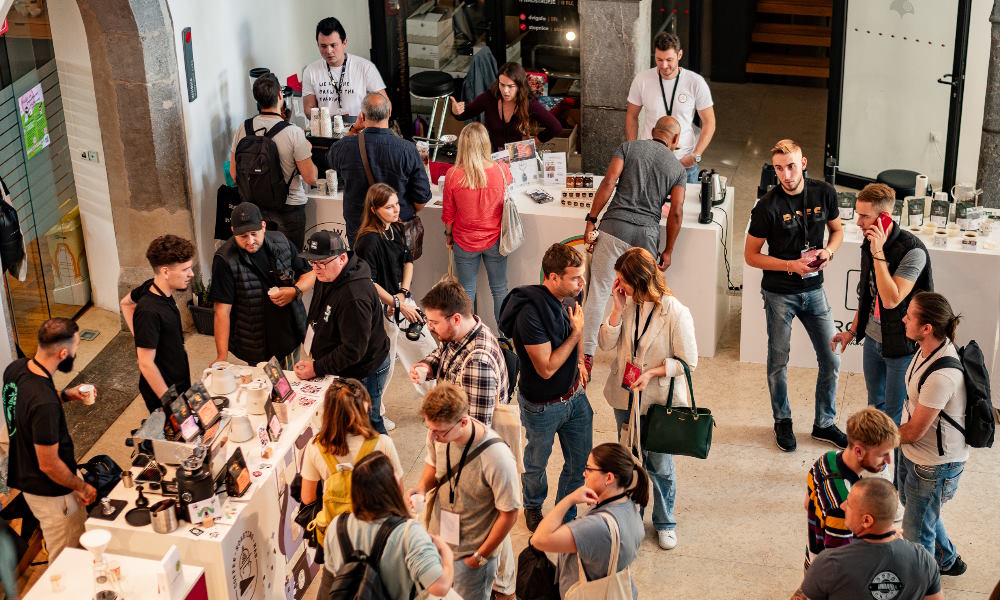Over the last few years, there has been a boom in specialty coffee-focused events. Increasing in both number and variety, trade shows, expos, and festivals are evolving – reflecting the growth of global specialty coffee culture more broadly.
In turn, events have become an increasingly important part of the industry. They have long served as springboards for roasters and other coffee brands to market themselves and potentially generate more revenue. More recently, a focus on education, networking, and competition is further supporting the growth of specialty coffee in several countries, including some prominent emerging markets.
To learn more, I spoke to Peter Ševič, the Director of Ljubljana Coffee Festival, and Aleš Turšič, the founder of Stow Coffee Roasters.
You may also like our article on how specialty coffee is evolving outside of more mature markets.
How the diversification of coffee events is reshaping the industry
Historically, traditional coffee events were confined to straightforward trade shows and exhibitions, mainly designed to provide roasters and other coffee brands with opportunities to sell their products, increase sales, and attract new customers. While this serves an essential purpose, there has been an increasing push in recent years to diversify the format of industry events to meet the evolving needs of the specialty coffee sector.
Today, coffee events – including festivals, expos, summits, and more – have become multifaceted experiences that prioritise quality, sustainability, and community engagement. Activities such as lectures, panel discussions, workshops, and competitions are increasingly key focal points, allowing visitors and exhibitors to obtain as much value as possible.
Peter Ševič is the Director of the Ljubljana Coffee Festival, the largest specialty coffee-focused event in Slovenia’s capital city. The most recent edition was held on 21 and 22 September 2024, bringing together over 3,000 national and international roasters, baristas, producers, importers, researchers, and coffee champions.
“Events have evolved because the specialty coffee industry is more sophisticated and diverse, with a greater emphasis on quality, sustainability, and the consumer experience,” he says.
As consumers become more discerning and knowledgeable, the industry is pushed to meet the demand for higher-quality coffee products and services. Given their crucial role in the broader industry, events are serving as essential platforms for brands to share knowledge, learn from their peers, and discover new ways to diversify their products.
“Trade shows alone are no longer sufficient; today’s coffee professionals and enthusiasts seek to deepen their knowledge and skills,” Peter adds. “Education through workshops, certifications, and seminars allows attendees to stay ahead of industry trends, while competitions offer a stage for baristas, roasters, and brewers to showcase their talents and push the boundaries of coffee innovation.
“These elements not only raise standards within the industry but also inspire a greater passion for coffee at all levels.”
The growth of events in emerging markets
Many expos, trade shows, and festivals are held in mature markets, including the US, Western Europe, and East Asia, where specialty coffee consumption is high – attracting large crowds of international industry professionals and specialty coffee enthusiasts.
However, as consumption grows around the world, it opens up new opportunities for event organisers and brands to develop different markets further. Over the past decade or so, there has been a sharp rise in the frequency and diversity of specialty coffee-focused events, including in emerging markets such as Central and Eastern Europe.
Established in 2016, the Ljubljana Coffee Festival exemplifies how regional coffee events can spur and support further market growth. “When pioneering roaster Stow first opened in Slovenia about ten years ago, there were probably no more than 30 people who had heard of specialty coffee in the country,” Peter says. “We then opened a coffee shop and an academy to increase awareness further and build a community, which then led us to create the event.
“At the time, there were few opportunities for consumers, baristas, roasters, and industry professionals to come together in one space, engage in dialogue, and experience high-quality coffees from around the world,” he adds. “The festival was launched to foster this connection and put Ljubljana on the map alongside the most important European specialty coffee events.”
The Slovenian capital is now home to a thriving specialty coffee scene, with a growing number of cafés and roasteries opening up across the country. Although growth has been slower compared to other central European countries like Hungary, Slovakia, and Poland – primarily attributed to Sloevnia’s proximity to Italy and historical Turkish influence – coffee consumer interest in quality and sustainability has increased significantly.
Aleš Turšič is the CEO and head roaster at Stow Coffee. “The Ljubljana Coffee Festival has been instrumental in driving the growth of the Slovenian specialty coffee market,” he tells me. “It has created a platform where both consumers and industry professionals can come together to experience and learn more about specialty coffee.”
Providing opportunities for skilled professionals and industry experts to connect and engage with curious customers in emerging markets is one of the driving forces behind rising specialty coffee consumption in the region.
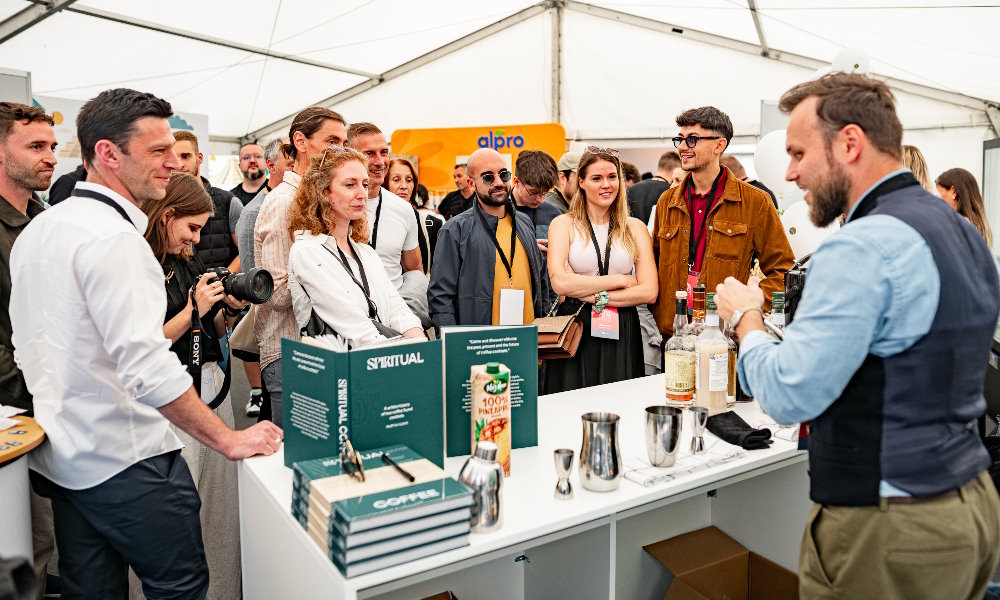
Building the coffee community through education and competitions
Founded on the principles of craft and artisanry, passionate people have always been a massive part of specialty coffee culture. Events have long been some of the most effective ways to cultivate and support a sense of community, particularly in emerging markets, by bringing together a diverse range of actors in the industry.
“We ensure all areas of the coffee supply chain are represented at the Ljubljana Coffee Festival. It includes farmers, importers, researchers, roasters, and world-champion baristas,” Peter tells me. “We even invite top Slovenian chefs and other gastronomy professionals so that the coffee industry can learn from the wider hospitality sector, too.”
Events foster an environment for organic collaboration and knowledge sharing. They also allow roasters, baristas, industry professionals, and coffee enthusiasts to learn from experts in a range of fields and nurture working relationships.
“Industry events are pivotal in growing national and regional specialty coffee markets because they provide a forum for education and exchange of ideas,” Aleš says. “They are no longer about just showcasing products: they have become platforms for meaningful dialogue on how the industry can adapt to changing consumer expectations.”
The role of educational events and competitions
An increasing focus on education and competitions at specialty coffee events in recent years underscores this shift. While exhibitions and product displays are invaluable opportunities for roasters and other companies to drive brand awareness and support further business growth, more coffee events have pivoted their focus onto offering educational activities and hosting innovative competitions to provide value to all attendees.
“This year’s event featured expert-led lectures on a wide range of topics, including the cultivation of exclusive and traditional varieties, insight into fermentation processes from renowned producers such as Café Inmaculada, Los Nogales, and the Santuario Project, and the science behind coffee preparation led by Dr. Samo Smrke from ZHAW,” Peter tells me. “Attendees took part in masterclasses featuring world barista champions, including James Hoffmann, Tim Wendelboe, Dale Harris, Martin Hudak, Carmen Clemente, and Manuela Fensore.”
He adds that the festival also hosted the 2024 Barista Battle Challenge and Latte Art Throwdown, testing and celebrating essential barista skills.
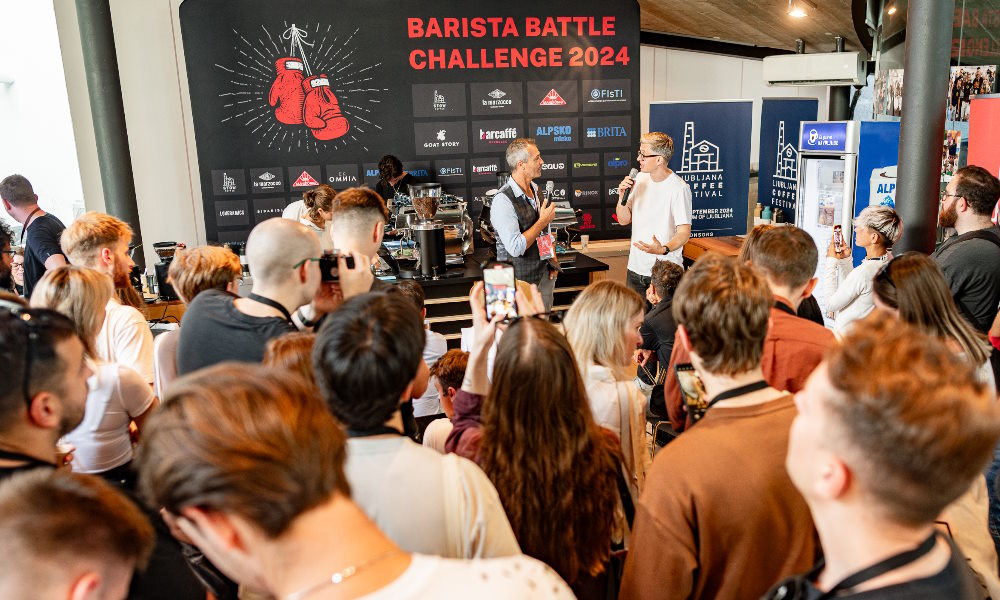
Bolstering knowledge in the coffee industry
In addition to the international Roaster Village and Slovenian coffee roasters exhibitions, the 2024 Ljubljana Coffee Festival included various talks as part of The Lab event programme, which covered a range of topics.
“We hosted a unique discussion about ‘Specialty Coffee and Haute Cuisine’ between some of the world’s leading coffee experts and top Slovenian chefs, such as James Hoffmann, Tim Wendelboe, and Dale Harris, along with distinguished Slovenian chefs like Igor Jagodic, Tomaž Bratovž, and Mojmir Šiftar,” Peter says. Panellists discussed how specialty coffee could enhance fine dining experiences, helping to increase broader awareness and appreciation of high-quality coffee.
“This year’s festival aimed to expand the horizons of coffee expertise, creativity, and artisanship, thereby nurturing a more profound bond between coffee experts and the culinary realm,” Peter notes.
Moreover, as competitions and education foster innovation, it encourages coffee businesses to refine their skills and expand their knowledge base.
“Roasters and coffee shops can use events to increase brand awareness by actively participating in workshops, competitions, and tastings,” Aleš tells me. “Being present at events not only puts your brand in front of a targeted audience but also allows you to showcase your expertise and unique offerings.”
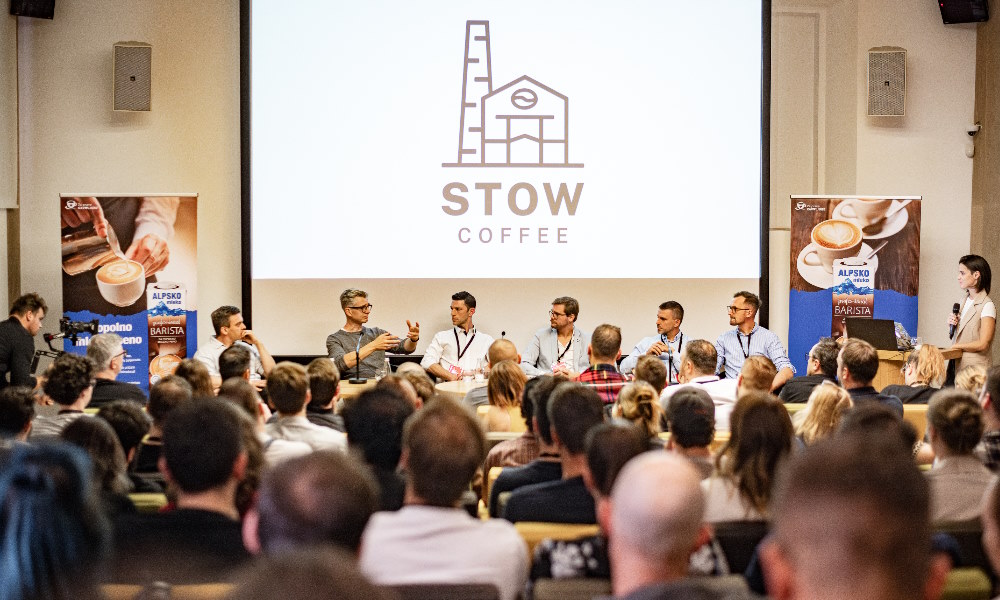
Why events will always play a key role in specialty coffee
The influence of coffee events on the industry extends beyond the exhibitors and visitors who take part; they can strengthen local and regional coffee communities. Local cafés and roasters gain more than just a platform to present their brand; they also obtain valuable insights into industry trends and practices that can significantly influence and enhance their business operations.
“At the Ljubljana Coffee Festival, we’re building a strong educational programme so that baristas, roasters, and café owners in Slovenia can learn from the experiences of international experts,” Peter says. “Our mission is to bridge the gap between tradition and innovation and to foster the growth of a dynamic coffee culture in the region.”
Looking ahead, events will clearly help spur further growth of specialty coffee markets around the world, particularly in less mature regions.
“Coffee events are essential for the continued growth of emerging specialty coffee markets. As markets like Slovenia develop, events provide a crucial platform for education, networking, and exposure to global trends,” Aleš says. “As more people attend and participate in these events, the specialty coffee culture will continue to grow and evolve, bringing more opportunities for both businesses and consumers to experience the best the industry has to offer.”
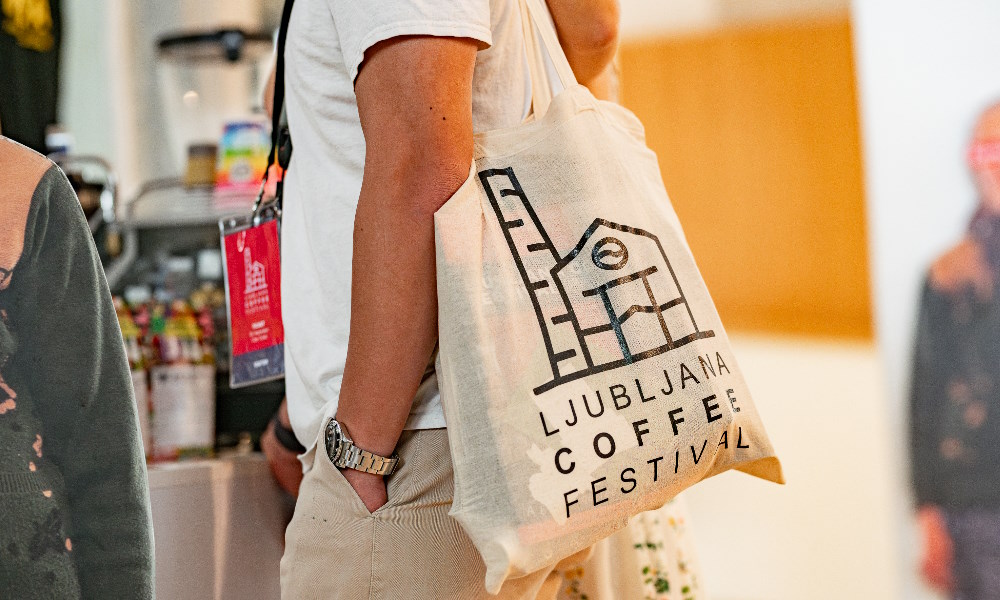
The growing number of coffee events underscores the role of community engagement within the specialty coffee sector, driving both brand awareness and market growth.
This is especially true for emerging markets, where events provide the opportunity for coffee businesses to engage more closely with consumers – potentially increasing consumption of specialty coffee in these regions.
Enjoyed this? Then, read our article on how coffee shops can expand into international markets.
Photo credits: Ljubljana Coffee Festival
Perfect Daily Grind
Please note: Ljubljana Coffee Festival is a sponsor of Perfect Daily Grind.
Want to read more articles like this? Sign up for our newsletter!
The post How events can support the growth of specialty coffee markets appeared first on Perfect Daily Grind.
